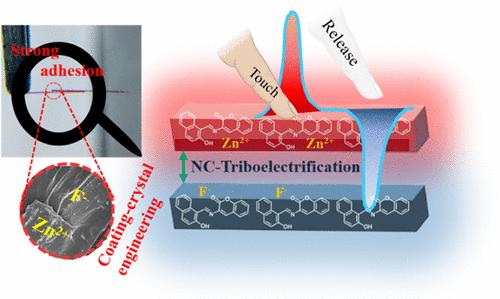作为自供电触觉传感器的柔性有机分子单晶三电器件
IF 14.4
1区 化学
Q1 CHEMISTRY, MULTIDISCIPLINARY
引用次数: 0
摘要
三电纳米发电机(TENGs)已被证明能有效地将机械能转化为电能,使其成为医疗诊断和环境监测中用于操作自供电电子设备的可行技术。在本研究中,我们展示了利用有机化合物的柔性单晶制造 TENG 作为自供电触觉传感器的实用性。在单晶体中分别使用带正电和负电的分子(即 Zn2+ 和 F-)进行表面功能化,从而实现了三电化,通过静电相互作用和感应现象产生了可变的表面电位和可逆的附着力。结合了单晶体的 TENG 显示出 2.4 V 的输出电压、2.2 μA/m2 的电流密度和 850 mW/m2 的功率密度,并且能够为商用电容器充电,从而确保其能够用作自供电触摸传感器。利用这些特点,我们制作了一个自供电触觉传感器来演示肢体运动。出色的机械电灵敏度(∼102 mV/kPa 至 6 kPa 范围)和响应时间(∼38 ms)确立了柔性有机单晶在机械能收集和生物传感应用方面的可行性,为将其用作生物医学可穿戴设备铺平了道路。本文章由计算机程序翻译,如有差异,请以英文原文为准。

Flexible Organic Molecular Single Crystal-Based Triboelectric Device as a Self-Powered Tactile Sensor
Triboelectric nanogenerators (TENGs) have proven to be effective at converting mechanical energy into electrical power, making them a viable technology for operating self-powered electronic devices used in medical diagnostics and environmental monitoring. In the present study, we demonstrate the utility of the flexible single crystals of an organic compound for the fabrication of a TENG as a self-powered tactile sensor. Triboelectrification was attained in single crystals as a result of surface functionalization with positively and negatively charged moieties, viz. Zn2+ and F–, respectively, which resulted in a variable surface potential and reversible adhesion through electrostatic interaction and induction phenomena. TENG incorporating the single crystals showed an output voltage of 2.4 V, a current density of ∼2.2 μA/m2, and a power density of ∼850 mW/m2 and was capable of charging commercial capacitors thereby ensuring its ability to be used as a self-powered touch sensor. Capitalizing on these features, a self-powered tactile sensor was fabricated to demonstrate limb movements. The excellent mechano-electric sensitivity (∼102 mV/kPa until 6 kPa range) and response time (∼38 ms) establish the viability of flexible organic single crystals for mechanical energy harvesting and biosensing applications that could pave the way for their utilization as biomedical wearable devices.
求助全文
通过发布文献求助,成功后即可免费获取论文全文。
去求助
来源期刊
CiteScore
24.40
自引率
6.00%
发文量
2398
审稿时长
1.6 months
期刊介绍:
The flagship journal of the American Chemical Society, known as the Journal of the American Chemical Society (JACS), has been a prestigious publication since its establishment in 1879. It holds a preeminent position in the field of chemistry and related interdisciplinary sciences. JACS is committed to disseminating cutting-edge research papers, covering a wide range of topics, and encompasses approximately 19,000 pages of Articles, Communications, and Perspectives annually. With a weekly publication frequency, JACS plays a vital role in advancing the field of chemistry by providing essential research.

 求助内容:
求助内容: 应助结果提醒方式:
应助结果提醒方式:


